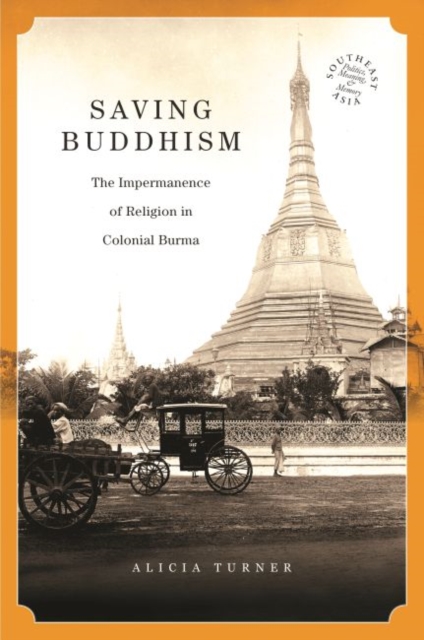
Saving Buddhism : The Impermanence of Religion in Colonial Burma Paperback / softback
by Alicia Turner
Part of the Southeast Asia: Politics, Meaning, and Memory series
Paperback / softback
Description
Saving Buddhism explores the dissonance between the goals of the colonial state and the Buddhist worldview that animated Burmese Buddhism at the turn of the twentieth century.
For many Burmese, the salient and ordering discourse was not nation or modernity but sasana, the life of the Buddha’s teachings.
Burmese Buddhists interpreted the political and social changes between 1890 and 1920 as signs that the Buddha’s sasana was deteriorating.
This fear of decline drove waves of activity and organizing to prevent the loss of the Buddha’s teachings.
Burmese set out to save Buddhism, but achieved much more: they took advantage of the indeterminacy of the moment to challenge the colonial frameworks that were beginning to shape their world.
Author Alicia Turner has examined thousands of rarely used sources - newspapers and Buddhist journals, donation lists, and colonial reports—to trace three discourses set in motion by the colonial encounter: the evolving understanding of sasana as an orienting framework for change, the adaptive modes of identity made possible in the moral community, and the ongoing definition of religion as a site of conflict and negotiation of autonomy.
Beginning from an understanding that defining and redefining the boundaries of religion operated as a key technique of colonial power—shaping subjects through European categories and authorizing projects of colonial governmentality—she explores how Burmese Buddhists became actively engaged in defining and inflecting religion to shape their colonial situation and forward their own local projects. Saving Buddhism intervenes not just in scholarly conversations about religion and colonialism, but in theoretical work in religious studies on the categories of “religion†and “secular.†It contributes to ongoing studies of colonialism, nation, and identity in Southeast Asian studies by working to denaturalize nationalist histories.
It also engages conversations on millennialism and the construction of identity in Buddhist studies by tracing the fluid nature of sasana as a discourse.
The layers of Buddhist history that emerge challenge us to see multiple modes of identity in colonial modernity and offer insights into the instabilities of categories we too often take for granted.
Information
-
Available to Order - This title is available to order, with delivery expected within 2 weeks
- Format:Paperback / softback
- Pages:240 pages
- Publisher:University of Hawai'i Press
- Publication Date:28/02/2017
- Category:
- ISBN:9780824872861
Other Formats
- Hardback from £80.00
Information
-
Available to Order - This title is available to order, with delivery expected within 2 weeks
- Format:Paperback / softback
- Pages:240 pages
- Publisher:University of Hawai'i Press
- Publication Date:28/02/2017
- Category:
- ISBN:9780824872861






